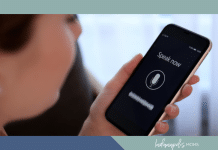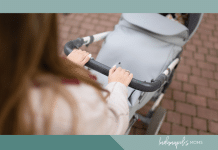
My daughter is now almost 18 months, and we are in the throes of some pretty serious separation anxiety-I’m talking full-on tears, clinging, and protest when I even so much as turn my back to her. It’s bringing back floods of memories from when my son went through this stage, and I’ve noticed that some people have quite a negative perception of separation anxiety. People tend to believe intense bouts of separation anxiety are signs that your child will be insecure and clingy. But it’s actually quite the opposite! Believe it or not, separation anxiety is actually a really good thing and a positive sign of healthy social-emotional development.
During typical healthy development, a baby will learn to feel secure and safe with her caregivers in infancy. As she learns to crawl and explore through play, the world becomes more exciting but also a bit scary because of how big an all-encompassing it is. The world is filled with endless new faces, new sensations, and new experiences. Babies often explore for a bit but then check back in with their caregiver by coming back to them physically or glancing to make sure they are nearby. The parent or caregiver then becomes a “secure base,” which means a sense of safety, security, and protection. So it’s easy to see why having your secure base leave can cause lots of distress and anxiety.
When your toddler becomes upset that you leave, this is actually a sign of the strength of your attachment and your relationship. We want children to feel connected to their parents-this leads to more independent and secure children. Without a secure base, children become more anxious or sometimes even aloof or indifferent to relationships. Like every stage of development, this will pass in time, but how you handle it can make a difference for your child. Here are a few tips for managing separation anxiety with your child’s mental health in mind:
1) Don’t sneak away in order to avoid the crying. This is my number one tip as it is the most common thing parents do. I mean, it makes sense, right? Don’t let them see you leave so they won’t be upset. The problem is that babies and toddlers start to think mommy can just leave at any time without warning. This creates even more fear and worry, and unintentionally increases the separation anxiety. Make sure you calmly tell your baby if you are leaving and let them know when you will be back. Even if they don’t talk yet, babies can understand a lot more than we think.
2) Keep goodbyes short and sweet. It’s tempting to want to hold or comfort your baby until they stop crying or seem happy when we leave, but this is often just delaying the inevitable. Predictability and routine help lessen the separation anxiety, so having a goodbye ritual or something you say to your baby at every departure is incredibly helpful. It can be something as simple as “It’s time for me to go to work baby girl, I’ll see you this afternoon. I love you.” Let your partner or caregiver soothe and hold the baby as you leave-chances are the big feelings only last a short while.
3) Play Games to help lessen the anxiety. Playing games like “peek-a-boo” or “hide-and-seek” can help your child better understand the leaving and returning process. If your toddler is a bit older, you can even play out scenarios with puppets or a dollhouse. Many good books address separation anxiety; my favorite is “The Kissing Hand” by Audrey Penn.
4) Encourage Independent Play. One of the tasks of this developmental stage is for babies to balance their need for closeness with their desires for more independence. We want to encourage independence when it is an option. Try setting up a play area nearby so they can play while you are getting things done in the kitchen. Take short trips out of the room if possible.
5) When possible, take baby with you. This is not a time to teach your baby to “toughen” up by leaving them more often. Babies and toddlers need more security and connection at this time, so bring them along with you to the laundry, outside to get the mail, or of course, stalk you as you go the bathroom. Often times, once they see that you are doing very routine things-it, will become less interesting and alluring. Remember, the way to make things worse is less connection-not more.
6) Have empathy. This stage can be super scary for little ones, and they need support from their parents. Try replacing statements like “Oh my gosh, calm down…I’m just walking to the other room” with more helpful comments like “You didn’t like that I walked away, I can see that. I had to grab this basket, lets put the laundry in together”. If you find yourself getting overly flustered and emotional during this developmental stage, take some time for yourself and examine where those feelings stem from.
Like all developmental stages, this too shall pass. This is not a sign that you work too much or a sign that you need to leave your children with more people (both things I’ve heard). If your baby or toddler cries when you leave but pretty quickly calms with a trusted caregiver, you are doing everything right, and all you have to do is ride out this stage with compassion and empathy for your child. If you feel like your child doesn’t seem to care if you leave or if your child remains upset for an extended period of time after you leave-this could be something to speak to your pediatrician about.








